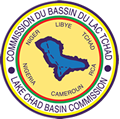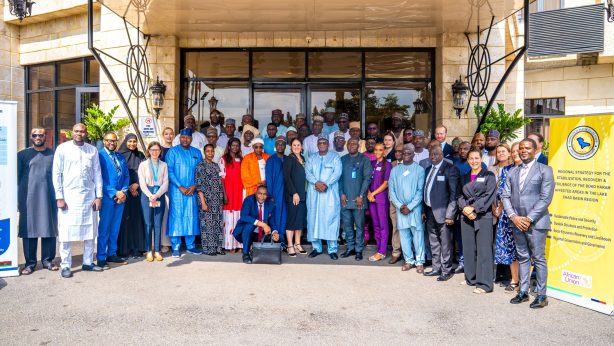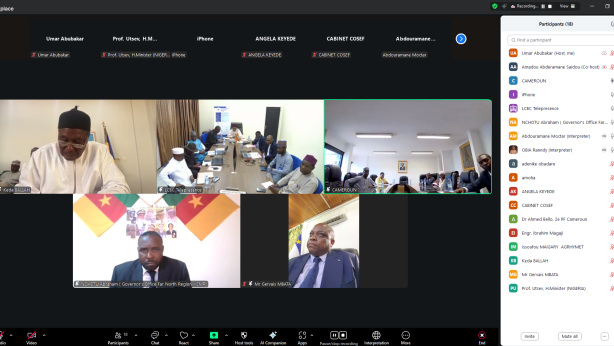End of the LCBC – GEF – UNDP Project
N’Djamena, 27 January 2024 – The project titled “Support to LCBC on Improving Lake Chad Management”, commonly known as the LCBC – GEF – UNDP project, held its Sixth Steering Committee Meeting in the meeting room of Hôtel Amitié. It was chaired by the Secretary General of the Ministry of Agricultural Production and Processing, representing the Minister of Water Resources and Sanitation, Chad’s First Commissioner to LCBC and current Chairman of the Council of Ministers of the LCBC Member States.
This 6th and final Steering Committee Meeting of the LCBC – GEF – UNDP project was attended by some thirty participants, including the First Commissioners of LCBC Member States or their representatives, LCBC National Focal Points or their representatives, the main executives of the Executive Secretariat of LCBC, UNDP representatives, Technical and Financial Partners (TFPs) of LCBC, Women and Youth organisations from the host country, and the Project Management Unit (PMU). The main purpose of the meeting was to take stock of the project’s overall implementation and to review and validate the outcomes and recommendations of the final evaluation before closing the project, which was launched in 2019.
Co-funded by the Global Environment Facility (GEF) and the United Nations Development Programme (UNDP) and implemented by the LCBC, the regional project titled “Improving the Management of Lake Chad Through Building Climate Change Resilience and Reducing Ecosystem Stress through the Implementation of the Strategic Action Programme for the Lake Chad Basin” — according to its long title- was initiated to support the LCBC and its Member States in achieving ecosystemic, integrated and resilient management of the Lake Chad Basin through the implementation of agreed policy, legal and institutional reforms, as well as investments to improve water quality and quantity, protect biodiversity and sustain livelihoods.
However, the launch of the project in November 2019 was seriously affected by restrictions imposed by governments in connection with COVID-19, such as difficulties in travelling within the country and in and out of the country, and the slowdown in activities by the UNDP, LCBC and national public administrations.
In addition, the development and implementation of income-generating activities based on the exploitation of natural resources have suffered from the inadequacy of the expected outcomes in the execution of the agreement signed for their implementation.
However, all these constraints have not undermined the achievement of the general objectives set, thanks in particular to the commitment of the project team with the support of experts from the Member States and LCBC.
The UNDP Deputy Resident Representative in Chad, Mr JOS DE LA HAYE, made a point of highlighting these considerable efforts in his remarks:
“Looking at the annual reports presented, it is safe to say that the project has achieved significant results in preserving and rehabilitating the ecosystems of the Lake Chad Basin.
The LCBC-GEF-UNDP regional project has strengthened the planning capacities of LCBC and its Member States, notably through the revision of the Strategic Action Programme, the development of a Transboundary Framework for Disaster Risk Reduction and a Regional Action Plan on Biodiversity.
The project’s support has also helped to create income-generating opportunities for communities based on the rational exploitation of natural resources. These pilot initiatives have not only demonstrated the potential of invasive plants for strengthening people’s livelihoods but also the benefits of reducing human pressure on the sustainability of ecosystems.
The Executive Secretary of the LCBC, in his opening remarks, thanked all the partners for their ongoing support and invaluable contribution to the people of the Lake Chad Basin, whom a confluence of crises has hard hit.
Without dwelling too much on the level of implementation of the project, the results achieved, the difficulties and challenges, Ambassador MAMMAN NUHU highlighted some key outcomes, including the updating of the Strategic Action Programme (SAP), which takes into account emerging issues in the Lake Chad Basin. This strategic document, he continued, was adopted by the 68th Council of Ministers and endorsed by the Summit of Heads of State and Government of the LCBC, held in Abuja in November 2022. The document will be the programmatic reference framework for this institution in charge of the harmonious management of Lake Chad and other environmental resources for the next fifteen years.
He also pointed to the need to build the technical capacity of experts from all LCBC Member States in the integrated management of water resources in the context of climate change, train and raise the awareness of users of the basin’s resources in rational techniques for exploiting resources and managing conflicts; and to improve the livelihoods of communities through pilot projects for income-generating activities (IGAs) based on the rational exploitation of resources.
In total, concluded the Executive Secretary, “the project has enabled the development and implementation of 33 micro-projects in the Member States, including 7 related to the control and promotion of invasive plants and 26 IGAs for a total of approximately FCFA 420,000,000, directly affecting nearly ten thousand people (nearly half of whom are women) organised into 76 women’s and men’s groups…”.
Opening the proceedings, the representative of the Minister for Water Resources and Sanitation, Chad’s First Commissioner to LCBC and current Chairman of the Council of Ministers thanked all those who travelled to the land of Toumaï and welcomed this strategic partnership between LCBC, its Member States, the Global Environment Facility (GEF) and the UNDP. This collaboration, he stressed, has made it possible to achieve the objectives assigned to the LCBC-GEF-UNDP project.
“As we take stock, and in accordance with the periodic reports sent to us, we are pleased to note that all of the project’s components have been effectively implemented. It has made a major contribution to reversing the trend of degradation of the lake’s resources and strengthening the resilience of ecosystems and populations to the effects of climate change.”
Lastly, the project’s operational framework has ensured that national experts are fully involved in the implementation and monitoring of activities and that they take ownership of the project’s achievements in order to make them sustainable.
The representative of the First Commissioner of Chad to the LCBC concluded his remarks by inviting all Member States to adopt a joint capitalisation strategy, together with a roadmap to enable the project’s achievements to be replicated and to ensure the consistency of its interventions with other programmes underway in the Lake Chad basin, so that, in the end, Lake Chad will regain its former splendour.
At the end of deliberations, the Steering Committee endorsed the implementation status of the 2023 AWP and the project’s activity report before adopting the following resolutions:
Mandated the ES/LCBC to work with the National Focal Points to validate the final project evaluation report,
Validated the extension of the project for 3 months (until 31 March 2024),
Authorised the transfer of materials and equipment procured under the project to LCBC,
Approved the process initiated by LCBC and the UNDP to obtain funding (GEF 8) for a second phase of the project,
Empowered Focal Points to monitor residual activities and capitalise on the project’s achievements.


